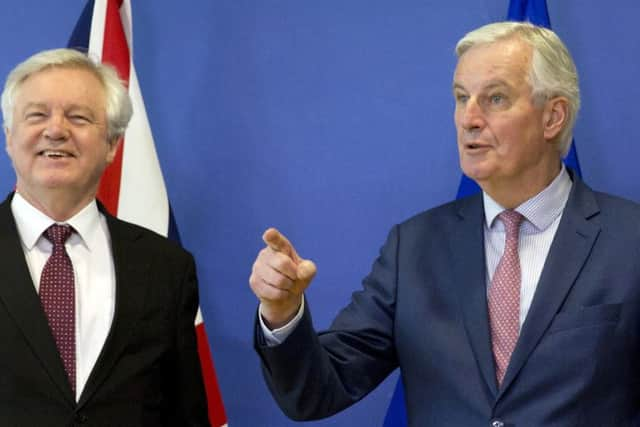Barnier: We have agreed '˜back stop position' over Irish border
and live on Freeview channel 276
At a joint press conference with Brexit Secretary David Davis, Mr Barnier said they had agreed that the EU’s “back stop position” - Northern Ireland effectively remaiing part of the single market if there was no wider agreement - would form part of the legal text of the withdrawal agreement.
“The backstop will apply unless and until another solution is found,” he said.
Advertisement
Hide AdAdvertisement
Hide AdMr Barnier said that there had been “complete agreement” on future citizens’ rights and the financial settlement as well agreement on a transition period after the UK leaves the EU in March 2019.


“We agreed that British citizens and European citizens of the 27 who arrive during that transition period will receive the same rights and guarantees as those who arrived before the day of Brexit,” he said.
Referring to Northern Ireland, Mr Davis said: “We agree on the need to include legal text detailing the ‘backstop’ solution for the border between Northern Ireland and Ireland in the withdrawal agreement that is acceptable to both sides.
“But it remains our intention to achieve a partnership that is so close as to not require specific measures in relation to Northern Ireland, and therefore we will engage in detail on all the scenarios set out in the joint report.
Advertisement
Hide AdAdvertisement
Hide Ad“We have also reached consensus on the full set of issues which need to be addressed in any solution in order to avoid a hard border, which is why, last week, we set out a work programme to tackle them.


“There are also some elements of the draft protocol - such as the Common Travel Area - on which we agree. So while there is as yet no agreement on the right operational approach, we know what we need to do - and we’re going to get on with it.”
The Brexit secretary said: “The aim in the whole exercise with respect to Ireland and Northern Ireland is to uphold the... Good Friday Agreement in its entirety.
“Is to ensure, therefore, there is no hard border, and to deliver a border, therefore, which is no impediment to any trade between Northern Ireland and Ireland, or, indeed, between the United Kingdom and Ireland.
Advertisement
Hide AdAdvertisement
Hide Ad“The United Kingdom Government remains steadfast in its commitment to avoiding a hard border between Northern Ireland and the Irish Republic.”
Mr Barnier said: “There has to be a backstop in the withdrawal treaty when we sign it in autumn.
“I think that if, between now and then, new proposals are made which provide at the same time, in the respect of all the dimensions of the Good Friday Agreement, for the absence of a hard border in Ireland, and that respect the European internal market, which the Republic of Ireland will be part of, if better solutions are presented we will examine them.”